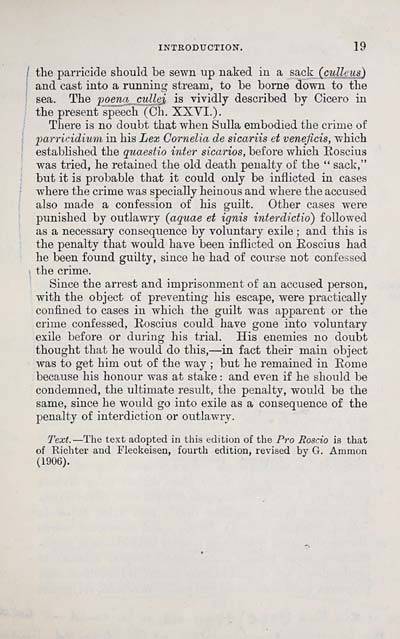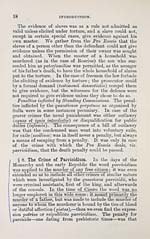Download files
Complete book:
Individual page:
Thumbnail gallery: Grid view | List view

INTRODTJCTION. 19
/ the parricide sliould be sewn up naked in a sack (culleus)
] and cast into a running stream, to be bome down to tlie
s sea. The poena cullei is vividly described by Cicero in
1 the present speech (Ch. XXVI.).
■ There is no doubt that when SuUa embodied the crime of
parricidium in his Lex Cornelia de sicariis et veneficis, which
established the quaestio inter sicarios, before whicli Eoscius
was tried, he retaiued tlie old death penalty of the " sack,"
but it is probable that it could only be infiicted in cases
where tlie crime was specially heiuous and where the accused
also made a confession of his guilt. Other cases were
punished by outlawry (aquae et ignis interdictio) foUowed
as a necessary consequence by voluntary exile ; and this is
the penalty that would have been inflicted on Eoscius had
he been found guilty, since he bad of course not confessed
the crime.
Since the arrest and imprisonment of an accused person,
with tlie object of preventing his escape, were practically
confined to cases in which the guilt was apparent or the
crime confessed, Roscius could have gone into voluntary
exile before or duriug his trial. His enemies no doubt
thought that he would do this, — in fact their main object
was to get him out of the way ; but he remained in Eome
because his honour was at stake : and even if he should be
condemned, tlie ultimate result, the penalty, would be tbe
same, since he would go into exile as a consequence of the
penalty of interdiction or outlawry.
Text. — The text adopted in this edition of the Pro Roscio is that
of Richter and Fleckeisen, fourth edition, revised by G. Ammon
(1906).
/ the parricide sliould be sewn up naked in a sack (culleus)
] and cast into a running stream, to be bome down to tlie
s sea. The poena cullei is vividly described by Cicero in
1 the present speech (Ch. XXVI.).
■ There is no doubt that when SuUa embodied the crime of
parricidium in his Lex Cornelia de sicariis et veneficis, which
established the quaestio inter sicarios, before whicli Eoscius
was tried, he retaiued tlie old death penalty of the " sack,"
but it is probable that it could only be infiicted in cases
where tlie crime was specially heiuous and where the accused
also made a confession of his guilt. Other cases were
punished by outlawry (aquae et ignis interdictio) foUowed
as a necessary consequence by voluntary exile ; and this is
the penalty that would have been inflicted on Eoscius had
he been found guilty, since he bad of course not confessed
the crime.
Since the arrest and imprisonment of an accused person,
with tlie object of preventing his escape, were practically
confined to cases in which the guilt was apparent or the
crime confessed, Roscius could have gone into voluntary
exile before or duriug his trial. His enemies no doubt
thought that he would do this, — in fact their main object
was to get him out of the way ; but he remained in Eome
because his honour was at stake : and even if he should be
condemned, tlie ultimate result, the penalty, would be tbe
same, since he would go into exile as a consequence of the
penalty of interdiction or outlawry.
Text. — The text adopted in this edition of the Pro Roscio is that
of Richter and Fleckeisen, fourth edition, revised by G. Ammon
(1906).
Set display mode to: Large image | Transcription
Images and transcriptions on this page, including medium image downloads, may be used under the Creative Commons Attribution 4.0 International Licence unless otherwise stated. ![]()
| Early Gaelic Book Collections > Matheson Collection > Pro S. Roscio Amerino > (27) |
|---|
| Permanent URL | https://digital.nls.uk/76502629 |
|---|
| Description | Items from a collection of 170 volumes relating to Gaelic matters. Mainly philological works in the Celtic and some non-Celtic languages. Some books extensively annotated by Angus Matheson, the first Professor of Celtic at Glasgow University. |
|---|
| Description | Selected items from five 'Special and Named Printed Collections'. Includes books in Gaelic and other Celtic languages, works about the Gaels, their languages, literature, culture and history. |
|---|

